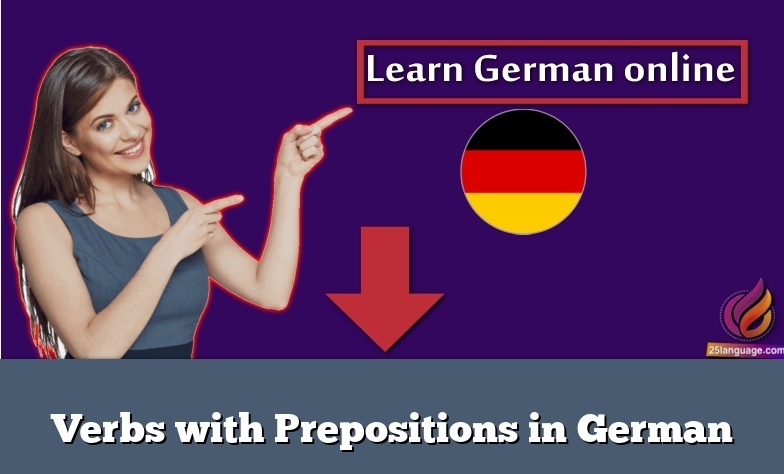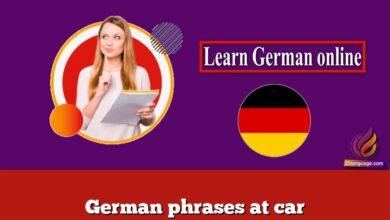Verbs with Prepositions in German
What Are Verbs with Prepositions in German?

German verbs with prepositions. In German, as well as in other languages like English or Spanish, there are verbs that we always have to use with a specific preposition. They are called prepositional verbs or verbs with fixed prepositions and in this post I’m going to explain what they are and how you should use them.
What are prepositional verbs?
Prepositional verbs are verbs that require a specific preposition in order to unfold their exact meaning. This preposition belonging to the verb often loses its original meaning. For example, auf usually means “on”:
- Ich stelle die Flasche auf den Tisch. – I put the bottle on the table.
- Die Flasche steht auf dem Tisch. – The bottle is (standing) on the table.

- Wartest du auf den Bus? – Are you waiting for the bus?
Also, when a preposition of the Two-Way Prepositions belongs to a verb, the accusative (wohin?) vs. dative (wo?) distinction disappears. This means, you not only have to learn the fixed preposition together with the verb (warten auf) but also you must learn by heart the case required by this specific combination (warten auf+acc.). Otherwise, the following could happen: if you used this expression with dative case (Ich warte auf dem Bus) you would be saying “I’m waiting on top of the bus“.
25 Verbs with prepositions | A2 | B1
How should I use prepositional verbs?


Accordingly, you have to use them together in order express what you wish to say. It is important to pay attention to the specific preposition(s) of a verb because there are many verbs whose meaning can change completely depending on the preposition used, for example bestehen:
- Dieser Verein besteht schon seit 5 Jahren (bestehen: intransitive) – exist, persist
- Ich hoffe, ich bestehe die Prüfung (bestehen: transitive) – pass an exam
- Die Prüfung besteht aus 4 Teilen (bestehen aus) – be made/composed of
- Die Aufgabe besteht in der Unterstützung der Lehrpersonen (bestehen in+D) – consist in
- Sie besteht immer auf Ehrlichkeit (bestehen auf+D) – insist on
Not only as a learning strategy, but also for correct comprehension of a sentence when reading, you should look out for these prepositions. Oftentimes they do not follow directly the verb they belong to but they are a few positions more to the right in the sentence.
Wo(r)- and da(r)- compounds
If you want to ask a question with a prepositional verb, you always have to use the preposition belonging to the verb in the question word. The “what…+prepos.” question becomes wo(r)– in German, as you can see in the following formula:
- If the preposition starts with a consonant, then use wo + preposition: womit, wofür, wovon, wozu. Example: Wofür interessierst du dich? – What are you interested in?
- If the preposition starts with a vowel, then use wo + r + preposition: woraus, worauf, worüber, worin. Example: Worauf besteht der Chef? – What does the boss insist on?
The meaning of the question word depends on the verb (it may be similar to the original meaning of the preposition, like in worüber – “about what”, but it can be very different):
- Wovon handelt das Buch? – What is the book about?
- Worauf wartest du? – What are you waiting for?
Please notice that we never use this wo(r)– question word for people. In this case, we use “preposition + wen/wem”: Für wen interessierst du dich? – Who are you interested in?
Da(r)- compounds, on the other hand, are pronouns that always refer to a thing or situation (never to a person!) mentioned before.
- Interessierst du dich für Fußball? – Nein, dafür interessiere ich mich überhaupt nicht. (Are you interested in football/soccer? – No, I’m not interested in that at all.)
- Gehen wir zusammen? – Ja, ich bestehe darauf. (Are we going together? – Yes, I insist on it [on going together])






























